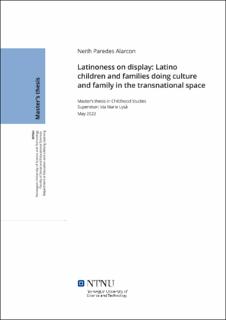| dc.description.abstract | This research study explores the everyday life navigation of children and families with Latino background in Trondheim, Norway. Underpinned by the application of child-centered, participatory and human rights-based approaches, children and their families are included as participants in this research. Based on the recognition of childhood as a context-dependent social category within the research field of Childhood studies, the definition of childhood within Latino culture is brought into the analysis of children’s experiences of the context. Thus, taking into consideration the existent relations of interdependence informed by Latino cultural values, such as familism and respeto, children’s and families’ individual and collective experiences are addressed through the application of an actor-oriented approach. The role that Latino families play in their children’s lives provides a backdrop for understanding their experiences of the context through adaptation and resistance, influencing the re-definition of their cultural identities and the development of sense of place and belonging. Latino children’s everyday navigation is informed by the performance of their cultural identity for reading, interpreting and understanding the new socio-cultural setting. As a result, the participants re-define their cultural identity by setting up differentiation criteria in relation to Norwegians. Based on these cultural differences, this study proposes two terms for gathering those features that determine individuals’ membership to one group or another: Latinoness and Norwegianness, two relational but not opposite categories. Thus, Latinoness becomes a unifier criterion of the widely in-group diversity among Latinos, emphasizing the role of culture for creating imagined communities. As fluid and contingent, culture becomes a tool for facing the multiple challenges that transnational migration brings about. Through its use in daily life, children and families shape the meaning that their culture takes, while finding their place in a different setting. | |
